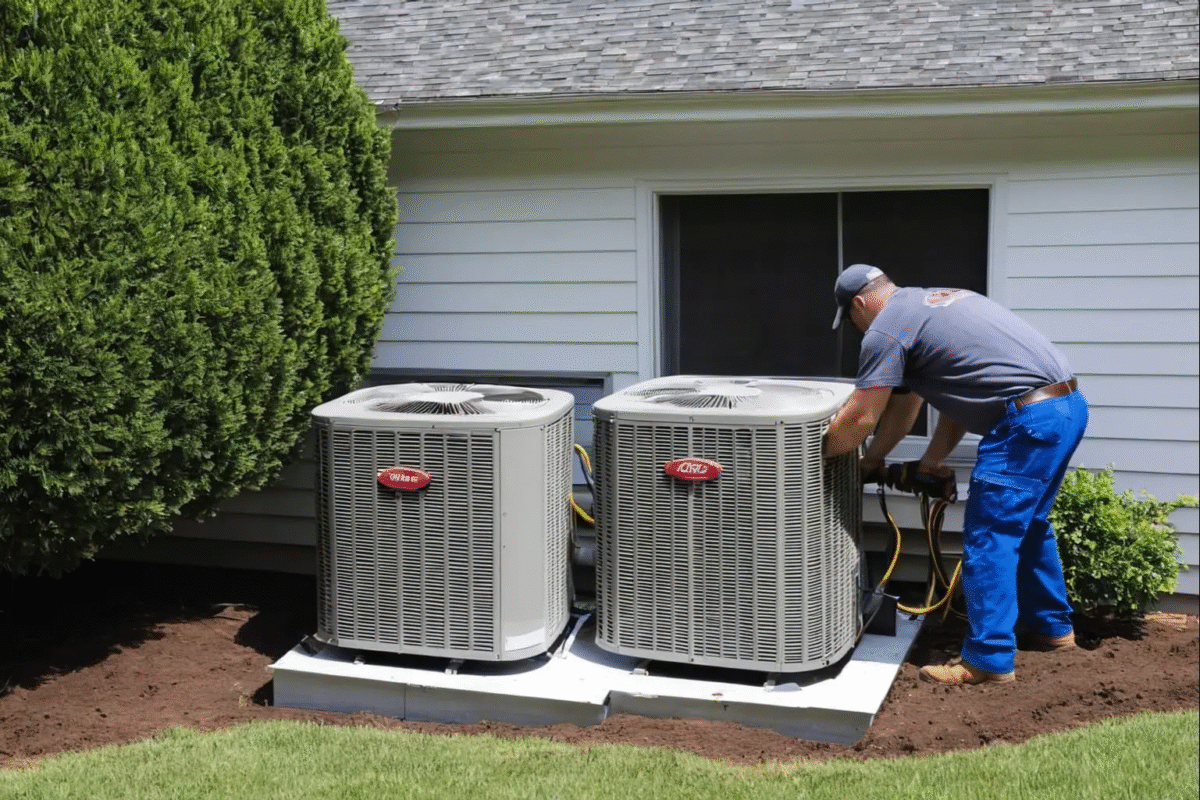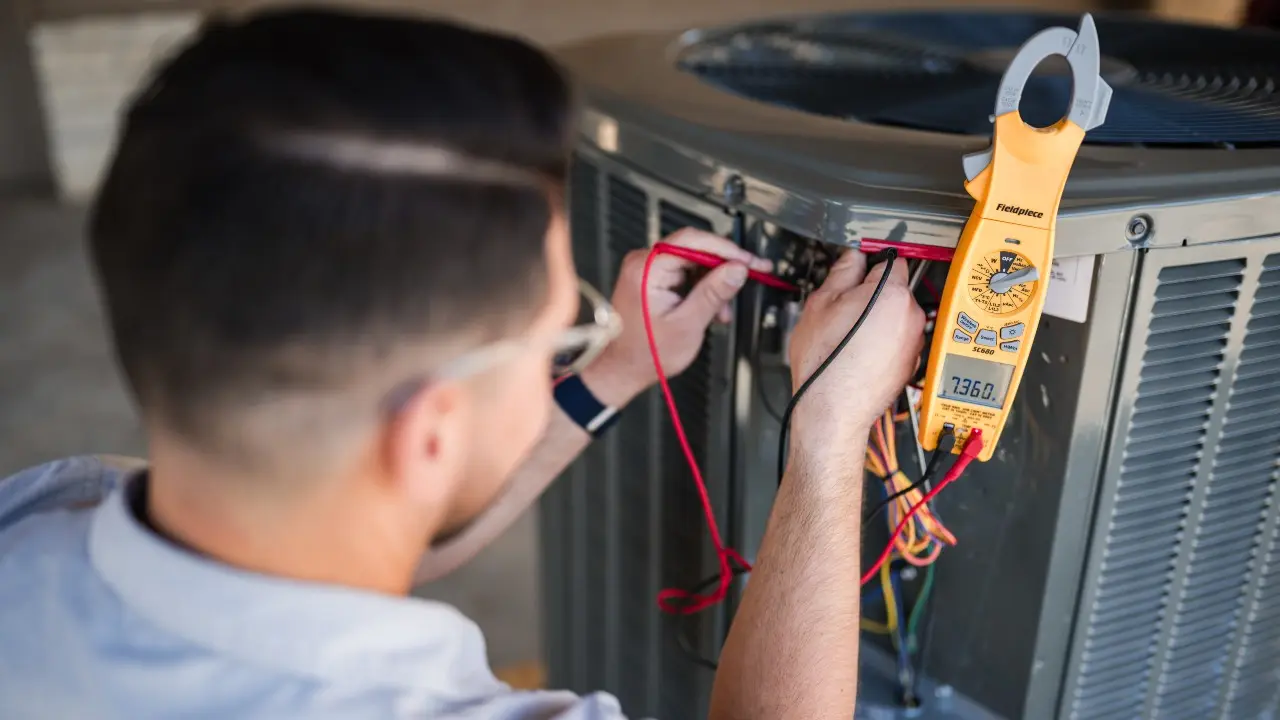When Houston’s relentless summer heat pushes temperatures above 95°F for months on end, your air conditioning system becomes more than just a comfort feature—it’s an essential lifeline for your family’s health and well-being. Yet surprisingly, nearly 40% of Houston homeowners struggle with inefficient cooling systems that drain their wallets while failing to keep their homes comfortable. The culprit? Choosing the wrong AC unit during installation, a costly mistake that can haunt you for the next 15-20 years.
Making the right AC installation decision for your Houston home requires understanding not just the basics of cooling technology, but also how our unique climate, with its crushing humidity levels averaging 75% year-round, impacts system performance. This comprehensive guide will walk you through every critical factor in selecting and installing the perfect AC unit for your specific needs.
Understanding Houston’s Unique Climate Demands
Houston’s subtropical climate presents extraordinary challenges for air conditioning systems. With average summer temperatures hovering around 94°F and humidity levels that can make 85°F feel like 100°F, your AC unit faces demands unlike those in drier climates. The combination of extended cooling seasons—often running from March through November—and extreme humidity means your system will log more operational hours than units in most other regions.

According to the Environmental Protection Agency, Houston homes require 30-40% more cooling capacity per square foot compared to homes in moderate climates. This increased demand stems from our unique weather patterns, including sudden temperature swings, tropical storms, and the urban heat island effect that makes downtown areas up to 5°F warmer than surrounding suburbs.
The salt air from the Gulf of Mexico adds another layer of complexity, accelerating corrosion in outdoor units. Systems installed near the coast typically require specialized coatings and more frequent maintenance to combat this environmental stress. Understanding these factors is crucial when selecting an AC unit that will perform reliably for years to come.
Types of AC Systems for Houston Homes

Central Air Conditioning Systems
Central air conditioning remains the gold standard for most Houston homes, particularly those over 2,000 square feet. These systems distribute cooled air through a network of ducts, providing consistent temperature control throughout your home. Modern central AC units achieve SEER ratings of 16-21, translating to significant energy savings compared to older models.
The primary advantage of central systems lies in their ability to handle Houston’s extreme heat while maintaining comfortable humidity levels. When paired with a variable-speed air handler, these systems can remove up to 400 gallons of moisture from your home’s air each week during peak summer months. However, installation costs typically range from $5,000 to $12,000, depending on home size and existing ductwork.
Ductless Mini-Split Systems
For homes without existing ductwork or those seeking zone-specific cooling, ductless mini-split systems offer an innovative solution. These systems have gained popularity in Houston’s historic neighborhoods where preserving architectural integrity makes traditional duct installation challenging. Each indoor unit connects to an outdoor compressor through small refrigerant lines, eliminating the need for extensive ductwork.
Mini-splits excel at providing targeted cooling, allowing you to set different temperatures in various rooms—ideal for Houston’s multi-generational households where comfort preferences vary. Energy efficiency expert Dr. Sarah Chen from Rice University notes, “Ductless systems can reduce cooling costs by up to 30% in homes where occupants spend most of their time in specific areas rather than cooling the entire house.”
Heat Pump Systems
While Houston’s mild winters might seem to make heating considerations secondary, heat pump systems offer year-round efficiency that makes them increasingly attractive. These versatile units provide both cooling and heating by reversing their refrigeration cycle, eliminating the need for separate heating equipment.
Modern heat pumps maintain efficiency even when Houston’s occasional cold snaps push temperatures into the 30s. The Department of Energy reports that heat pumps can reduce electricity use for heating by approximately 50% compared to electric resistance heating. For Houston homeowners, this dual functionality means one system to maintain, one warranty to track, and simplified home comfort management.
Sizing Your AC Unit Correctly
Proper sizing stands as the single most critical factor in AC installation success. An undersized unit will run continuously, struggling to cool your home while driving up energy bills and wearing out prematurely. Conversely, an oversized unit will cool too quickly, shutting off before properly dehumidifying your air—a serious problem in Houston’s moisture-laden climate.
Manual J Load Calculation
Professional HVAC contractors use Manual J load calculations to determine your home’s exact cooling needs. This comprehensive assessment considers factors including:
- Total square footage and ceiling heights
- Window sizes, locations, and efficiency ratings
- Insulation levels in walls, attics, and crawl spaces
- Number of occupants and heat-generating appliances
- Orientation of your home relative to sun exposure
- Local climate data specific to your Houston neighborhood
A proper Manual J calculation can reveal surprising insights. For instance, a well-insulated 2,500-square-foot home with energy-efficient windows might require less cooling capacity than a poorly insulated 2,000-square-foot home with single-pane windows.
Common Sizing Mistakes to Avoid
The “bigger is better” mentality leads many homeowners astray during AC installation. Industry data shows that up to 50% of installed systems are improperly sized, with most erring on the side of excess capacity. In Houston’s humid environment, oversized systems create a particularly uncomfortable phenomenon called “cold clammy syndrome,” where homes feel cool but uncomfortably damp.
Rule-of-thumb sizing based solely on square footage ignores crucial variables that impact cooling loads. A professional assessment from a certified AC repair and installation specialist ensures your system is precisely matched to your home’s unique characteristics.
Energy Efficiency Ratings Explained
SEER Ratings and Houston Requirements
Seasonal Energy Efficiency Ratio (SEER) ratings indicate how efficiently an AC unit converts electricity into cooling power. As of 2023, the minimum SEER rating for new installations in Houston is 15, though many homeowners opt for higher-efficiency models rated 18-21 SEER or above.
The financial impact of SEER ratings becomes clear when examining operational costs. Upgrading from a 10 SEER unit (common in homes built before 2006) to a 16 SEER model can reduce cooling costs by approximately 38%. For the average Houston home spending $2,400 annually on cooling, this translates to savings of over $900 per year.
ENERGY STAR Certification Benefits
ENERGY STAR certified AC units meet strict efficiency guidelines set by the EPA, typically exceeding minimum SEER requirements by 8-12%. These units undergo rigorous third-party testing to verify performance claims, giving homeowners confidence in their investment.
Beyond energy savings, ENERGY STAR units often qualify for utility rebates and federal tax credits. CenterPoint Energy, Houston’s primary electricity delivery company, offers rebates ranging from $150 to $500 for qualifying high-efficiency installations. Combined with federal tax credits covering up to 30% of installation costs (capped at $2,000), these incentives can significantly offset upfront expenses.
Key Features for Houston Homes
Humidity Control Capabilities
Standard AC units remove some moisture during operation, but Houston’s extreme humidity demands enhanced dehumidification features. Look for systems with variable-speed compressors and multi-stage cooling, which run at lower speeds for longer periods, extracting more moisture without overcooling your space.
Advanced humidity control features include:
- Dedicated dehumidification modes that prioritize moisture removal
- Reheat coils that warm slightly overcooled air to comfortable temperatures
- Integration with whole-home dehumidifiers for comprehensive moisture management
- Smart thermostats with humidity sensors and customizable comfort settings
Corrosion-Resistant Components
Houston’s coastal proximity exposes outdoor AC units to salt-laden air that accelerates corrosion. Manufacturers now offer specialized coastal models featuring aluminum coils, stainless steel screws, and protective coatings that extend equipment life by 5-7 years compared to standard units.
The investment in corrosion resistance pays dividends over time. While coastal-rated units cost 10-15% more initially, they maintain efficiency longer and require fewer repairs, ultimately providing better value for Houston homeowners within 30 miles of the coast.
Smart Technology Integration
Modern AC systems increasingly incorporate smart technology that optimizes performance while maximizing convenience. Wi-Fi-enabled thermostats allow remote temperature adjustments, ensuring you return to a comfortable home without cooling empty spaces all day.
Advanced features gaining popularity in Houston include:
- Geofencing that automatically adjusts settings based on your location
- Energy usage tracking with personalized savings recommendations
- Predictive maintenance alerts that prevent unexpected breakdowns
- Integration with voice assistants for hands-free control
- Zoning capabilities that customize comfort room by room
Installation Cost Factors
AC installation costs in Houston vary significantly based on multiple factors beyond the unit itself. Understanding these variables helps you budget accurately and avoid unexpected expenses.
Equipment and Labor Breakdown
For a typical 3-ton central AC installation in Houston, costs break down approximately as follows:
| Component | Cost Range | Percentage of Total |
|---|---|---|
| AC Unit (3-ton, 16 SEER) | $2,500 – $4,000 | 40-45% |
| Installation Labor | $2,000 – $3,500 | 30-35% |
| Additional Materials | $500 – $1,000 | 8-10% |
| Permits and Inspections | $200 – $500 | 3-5% |
| Ductwork Modifications | $500 – $2,000 | 8-15% |
Factors That Increase Installation Costs
Several circumstances can push installation costs above typical ranges. Homes requiring extensive ductwork replacement or installation may see costs increase by $3,000 to $7,000. Electrical panel upgrades, necessary for older homes with insufficient power capacity, add another $1,500 to $3,000.
Accessibility challenges also impact pricing. Second-story installations, cramped attic spaces, or historical home restrictions requiring specialized installation techniques can increase labor costs by 20-30%. Always request detailed quotes that itemize these potential additions to avoid budget surprises.
Choosing the Right HVAC Contractor
Essential Credentials to Verify
Selecting a qualified HVAC contractor protects your investment and ensures safe, code-compliant installation. Texas requires HVAC contractors to hold state licenses, with the Texas Department of Licensing and Regulation maintaining a public database for verification.
Critical credentials include:
- Texas Air Conditioning Contractor License (TACL)
- Liability insurance minimum $1 million coverage
- Workers’ compensation insurance for all employees
- Better Business Bureau accreditation with A+ rating
- Manufacturer certifications for warranty validation
- NATE (North American Technician Excellence) certification
Red Flags to Avoid
Beware of contractors offering suspiciously low bids or pressuring immediate decisions. Legitimate contractors provide detailed written estimates, explain equipment options thoroughly, and never demand full payment upfront. Houston’s competitive HVAC market unfortunately attracts unscrupulous operators who cut corners on installation quality or use substandard equipment.

Warning signs include contractors who skip Manual J calculations, refuse to pull permits, or cannot provide recent references from Houston-area installations. As veteran HVAC instructor Michael Rodriguez from Houston Community College advises, “A professional contractor welcomes questions and takes time to educate homeowners about their options. If someone seems rushed or evasive, find another contractor.”
Warranty and Maintenance Considerations
Understanding Manufacturer Warranties
AC manufacturer warranties typically cover parts for 10 years, with some premium brands extending coverage to 12 years or offering lifetime compressor warranties. However, these warranties often require professional installation and annual maintenance to remain valid—details many homeowners discover too late.
Labor warranties, covering installation workmanship, vary by contractor but should minimum one year. Leading AC maintenance providers in Houston often extend labor warranties to 2-3 years, demonstrating confidence in their installation quality.
Importance of Regular Maintenance
Houston’s demanding climate makes regular AC maintenance non-negotiable for system longevity. Professional maintenance twice yearly—before summer’s peak heat and after cooling season—keeps your system operating efficiently while catching minor issues before they become major repairs.
Maintenance tasks that significantly impact system performance include:
- Cleaning or replacing filters monthly during peak season
- Checking refrigerant levels and addressing any leaks
- Cleaning evaporator and condenser coils annually
- Lubricating motors and checking electrical connections
- Calibrating thermostats for accurate temperature control
- Inspecting and cleaning condensate drains to prevent water damage
Common Installation Mistakes to Avoid
Even with professional installation, certain mistakes occur frequently enough to warrant vigilance. Improper refrigerant charging tops the list, with studies showing up to 70% of systems have incorrect refrigerant levels, reducing efficiency by 20-30% and shortening equipment life.
Inadequate drainage poses particular risks in Houston’s humid climate. Condensate lines must maintain proper slope and include overflow protection to prevent water damage. Secondary drain pans with float switches provide crucial backup protection, yet many installations omit these safeguards to reduce costs.
Poor ductwork sealing represents another common oversight. The Department of Energy estimates typical homes lose 20-30% of cooled air through duct leaks. Professional duct sealing using mastic sealant or metal-backed tape—never standard duct tape—ensures your new system operates at peak efficiency.
Environmental Impact and Sustainability
Modern AC installations offer opportunities to reduce environmental impact while lowering operating costs. R-410A refrigerant, standard in new systems, has zero ozone depletion potential compared to older R-22 refrigerant being phased out globally.
High-efficiency systems reduce carbon footprints significantly. Upgrading Houston’s estimated 1.6 million single-family homes to ENERGY STAR certified AC units would eliminate greenhouse gas emissions equivalent to removing 500,000 cars from roads annually.
Sustainable installation practices gaining traction include:
- Recycling old equipment through certified programs
- Installing programmable thermostats to minimize unnecessary cooling
- Incorporating solar panels to offset electricity consumption
- Selecting units with eco-friendly refrigerants like R-32
- Implementing zoning systems to cool only occupied spaces
Frequently Asked Questions

How long does AC installation typically take in Houston?
Standard AC replacement installations complete within 4-8 hours for experienced crews. New installations requiring ductwork may extend to 2-3 days. Factors like accessibility, electrical upgrades, and permit inspections can add time.
What’s the best time of year to install a new AC in Houston?
Spring (March-April) and fall (October-November) offer ideal installation timing. Contractors have more availability, allowing thorough installation without rushing. Off-season installations often qualify for manufacturer promotions and contractor discounts.
Can I install a new AC unit myself to save money?
Texas law requires licensed contractors for AC installations involving refrigerant handling. DIY installation voids manufacturer warranties, violates local codes, and risks serious safety hazards including electrical fires and refrigerant exposure.
How do I know if I need to replace my entire system or just the outdoor unit?
Replacing only the outdoor unit rarely makes economic sense. Mismatched indoor and outdoor units operate inefficiently, often voiding warranties. If your system exceeds 10 years old, complete replacement typically provides better long-term value.
What financing options are available for AC installation in Houston?
Most reputable contractors offer financing through partnerships with lenders specializing in home improvements. Options include 0% interest promotions for 12-18 months, extended payment plans up to 10 years, and specialized programs for energy-efficient upgrades.
Will a new AC installation increase my home’s value?
According to Houston Association of Realtors data, homes with new high-efficiency AC systems sell 5-7% faster and command 2-3% higher prices than comparable homes with older systems. The return on investment typically ranges from 50-70% of installation costs.
Conclusion: Making Your AC Installation Decision
Choosing the right AC unit for your Houston home represents a significant investment in your family’s comfort, health, and financial well-being. The unique demands of our subtropical climate—with its crushing heat, oppressive humidity, and extended cooling seasons—make this decision particularly crucial. By understanding system types, sizing requirements, efficiency ratings, and installation best practices, you’re equipped to make an informed choice that will serve you well for the next 15-20 years.
Remember that the lowest bid rarely represents the best value. Professional installation by licensed, insured contractors using quality equipment and following industry best practices ensures your system operates efficiently, maintains warranty coverage, and provides reliable comfort through Houston’s toughest weather. The extra investment in higher SEER ratings, humidity control features, and professional AC installation services pays dividends through lower operating costs, fewer repairs, and enhanced home comfort.
Don’t let another Houston summer catch you unprepared. Take action today by scheduling a professional consultation with 75 Degree AC, Houston’s trusted HVAC experts. Our certified technicians provide comprehensive home assessments, transparent pricing, and expert installation that ensures your new AC system delivers maximum comfort and efficiency. Call (713) 598-2737 now for your free installation quote and experience the difference that professional expertise makes. Your family’s comfort can’t wait—let us help you choose and install the perfect cooling solution for your Houston home.

